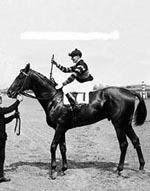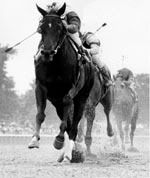Sir Barton was born in 1916 to the 17-year-old mare, Lady Sterling. He had great breeding, but was plagued with soft, shelly hoofs which he inherited from his sire, Star Shoot. Because of these unlucky feet, Sir Barton hurted whenever he walked, and shoeing was always hard to do.
In 1918, the chestnut colt raced. His first start was not one of the dignity that he had in his lineage. He finished fifth.
In his next few starts, he finished out of the money. He was then sold to Commander John Kennith Levison Ross. Ross believed that through his trainer, H. G. Bedwell, the colt could be brought back to a winning colt.
With the proper care and handling, Sir Barton began showing incredible speed in training. He was entered in some races, and although he got in the money, he still did not get his taste of victory. Those few races ended his two-year-old season.
In 1919, Sir Barton's stablemate Billy Kelly was entered in the Kentucky Derby. Sir Barton was sent along at the last moment to act as a sort of companion for Billy Kelly. Soon it was decided that Sir Barton should also be entered into the Kentucky Derby. Because he had beaten Billy Kelly before, Sir Barton would act as the "rabbit." He was given instructions to set a very fast pace right at the start of the race, and Billy Kelly would be held back. By the time the horses got to the homestretch, the field as well as Sir Barton would be tired out, and Billy Kelly could make his move and win.
They put the plan into action. Sir Barton got into the lead right when the horses leapt from behind the barrier (in those days, there was only an elastic webbing which the horses lined up behind. The barrier would be flung up suddenly, and the horses would shoot forward). He kept the lead, even into the homestretch, when Ross and Bedwell thought sure that he would tire. In the end, he lead Billy Kelly across the finish line five lengths in the lead. He became the fist maiden to ever win the Derby.
Ross and Bedwell decided tp enter Sir Barton in the Preakness Stakes four days later (the Preakness Stakes is now two weeks after the Kentucky Derby). The second jewel of the Triple Crown was hard to get in those days because of the fact that horses had to be shipped immediately after running the Derby, and then they had barely any time to train. Many got sick on the train and were not able to race. Not Sir Barton, however. He was entered into the Preakness with the instructions to get out in front and stay there. Sir Barton did so, and like the Derby, was never headed.
Now the excitment over a new-found hero was rising. The Derby had been muddy, and many thought that was why the favorites did not come on to win. But the Preakness had been fast, and still Sir Barton had done as before, leading until the end. He was definetely a great horse, everyone decided.
With high hopes of winning the Triple Crown, Sir Barton was entered into the Belmont Stakes, four weeks later. In the meantime, Sir Barton won the Withers on May 24.
Sir Barton was at odds of a whopping 7-20. During this time of wait for the big race, Sir Barton had become a snob, partly because of his hurting feet. He ignored other horses, hated pets, and despised humans. He gave his trainer fits. He would only extend himself in workouts when he was made to think that he was in a real race. Fresh horses became tired because they had to race Sir Barton in order to satisfy him.
Finally, the Belmont came. Sir Barton ran the race easily, winning in a canter by five lengths with jockey Johnny Loftus aboard (who also rode him in the Derby and Preakness). He had set a new time record of 2:17 2/5 for the 1 3/8 mile race (it is now 1 1/2 miles). As Sir Barton crossed under the finish pole, he became not only the first Triple Crown Winner, but also the first horse to win the Derby, Preakness, Withers, and Belmont. This was not duplicated until 24 years later by Count Fleet.
The next year, Sir Barton had an on-and-off spring. Often he did not run well, and then there were times when he ran real good. The summer went better.
Meanwhile, the mighty Man O' War, sired by Fair Play and out of Mahubah, was winning races and showing the world that he was more than "just a racehorse." He was the champion of all the world. He had beaten all the best horses horses of his time, including Exterminator, except for Sir Barton. He had finished second one time to Upset in the Sanford Memorial, in which he was facing backwards when the race started and his jockey made three big mistakes. All his other races were firsts.
Although the horse was fast, Sir Barton had run a distance that he had run in one second faster and carrying two extra pounds. Now everyone demanded a match race to be held between the two. It was decided, and the track who offered the most purse money was Kennilworth track in Canada, with a $75,000 and a $5,000 gold cup. Ross and the owner of Man O' War, Riddle, accepted just a few hours before another track offered a $100,000 purse.
Sir Barton was taken to the track to train, and so was Man O' War. Ross had trouble deciding who should ride Sir Barton. Johnny Loftus hadn't been able to get his license that year, and Clarence Kummer had already been selected to ride Man O' War. Ross put Earl Sande up, but an hour before the race, he changed his mind. Frank Keogh would ride the champion. When the news was broken to Earl Sande in the jockey's room, he sat down and cried. Ross said he had no grudges against Earl Sande, it was only that, in trying to keep his weight down, Earl Sande had been getting queezy and in recent races had lost.
The two champions lined up. Neither owner needed the money from the purse, but if Man O' War won, he would top the $200,000 mark and be the leading money winner for a little. If Sir Barton won, it would only increase his fame.
The horses started, and what was supposed to be a match race was barely a match race at all. The horses battled for a few brief seconds; then, Man O' War was in the lead, and he stayed in the lead, crossing under the finish line seven lengths ahead of Sir Barton.
Did Man O' War break Sir Barton's heart? It seems that he did, for Sir Barton never won a race again. He was soon retired.
On October 30, 1937, Sir Barton died of colic. He had been sold to many ranches, and his colts that he had sired were not very succesful. His fillies seemed to be the best of the foals he sired.
In the Blood Horse Magazine List of the Top 100 U.S. Racehorses, Sir Barton is ranked No. 49.
So went the story of the first Triple Crown Winner in history.







0 comments:
Post a Comment